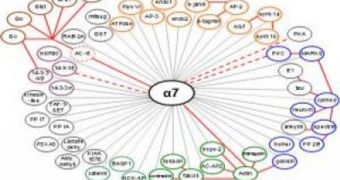Scientific opinions on nicotine are a bit contradictory at the moment, with some researches showing that the compounds found in tobacco are linked to lung cancer, and others arguing that some of the chemicals in the stuff may actually have a bright side too. Now, a new study from experts at the Brown University comes to show that, apart from being addictive, tobacco also reshapes the way in which cells interact throughout the human body. The good thing about this investigation is that it may open up new avenues for research, which could end with the development of new therapies for a number of medical conditions in which research is now at a stand-still.
The new cellular interactions that have been recently discovered may be the target of new drugs in the future, BU Professor of molecular science, molecular pharmacology, physiology and biotechnology Edward Hawrot, who has also been the lead author of the new paper, published in the April 3rd issue of the Journal of Proteome Research, explains. “It opens several new lines of investigation,” he says.
For their research, the BU team, composed of Hawrot and graduate students William Brucker and Joao Paulo, have focused their attention on “nicotinic” receptors, substances that nicotine binds to when it's introduced in the body. Specifically, the alpha-7 nicotinic acetylcholine receptor has been the most researched in mice. This specific receptor that the animals have is very similar to the one that can be found in humans, so the results of the study are applicable to us as well.
More than 55 proteins that interact with A7NA have been discovered, other than the substances found in nicotine. “This is called a 'nicotinic' receptor and we think of it as interacting with nicotine, but it likely has multiple functions in the brain. And in various, specific regions of the brain this same alpha-7 receptor may interact with different proteins inside neurons to do different things,” Hawrot adds. Before these results were published, scientists around the world had no idea that these interactions even existed, in animals or in humans.

 14 DAY TRIAL //
14 DAY TRIAL //